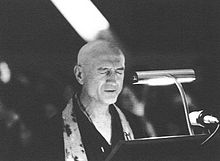Philip Kapleau
Philip Kapleau (* 20th August 1912 in New Haven , Connecticut ; † 6. May 2004 ) was an American Zen - monk and author .
Philip Kapleau grew up in a working class family . He studied law as a young man and then worked for several years as a court reporter in various Connecticut courts. He did this so well that in 1945 he was first appointed chief rapporteur for the Nuremberg Trials and then reported on the Tokyo Trials .
The preoccupation with the atrocities of the Second World War touched him very deeply and awakened a deep spirituality in him that shaped his further life.
Zen Buddhism
During his time in Japan , Kapleau took an interest in Zen Buddhism and became a student of DT Suzuki and other Zen teachers. When he returned to America in 1950, he studied Buddhist philosophy with DT Suzuki, who was a professor at Columbia University , until 1953 . But his spiritual preoccupation with Buddhism was not enough for him and so he entered a Zen monastery in Japan in 1953. For the next 13 years, Philip Kapleau underwent very rigorous training with three teachers before he was ordained and licensed to teach in 1965.
During this time he rediscovered his writing skills and transcribed, among other things, teacher-student conversations, interviewed monks and thus offered insights into everyday monastic life. Published as a result of this work Kapleau 1965 his book The Three Pillars of Zen (dt. The three pillars of Zen (1969), translated into German by Brigitte D'Ortschy ). It became a world bestseller and standard work of Zen, because Kapleau succeeded in introducing the Zen culture to the “western world”. Kapleau published several books on this subject.
In 1996, a long-awaited wish came true for Kapleau when a good family friend donated his property and he opened the Chapin Mill Retreat Center , a Buddhist center.
Works (selection)
- The three pillars of Zen. Teaching, practice, enlightenment , Barth, Frankfurt / M. 2004, ISBN 3-502-61132-7
- The fourth pillar of Zen. The way to discover the wonderful in the everyday , Barth, Frankfurt / M. 2000, ISBN 3-502-64356-3
- The Zen Book of Living and Dying. A spiritual advisor , Barth, Frankfurt / M. 2001, ISBN 3-502-61057-6
- Enlightenment not excluded. Zen stories, Zen conversations , Herder, Freiburg / B.2003, ISBN 3-451-05325-X
Web links
- Literature by and about Philip Kapleau in the catalog of the German National Library
| personal data | |
|---|---|
| SURNAME | Kapleau, Philip |
| BRIEF DESCRIPTION | American Zen monk and author |
| DATE OF BIRTH | August 20, 1912 |
| PLACE OF BIRTH | New Haven (Connecticut) , Connecticut |
| DATE OF DEATH | May 6, 2004 |
